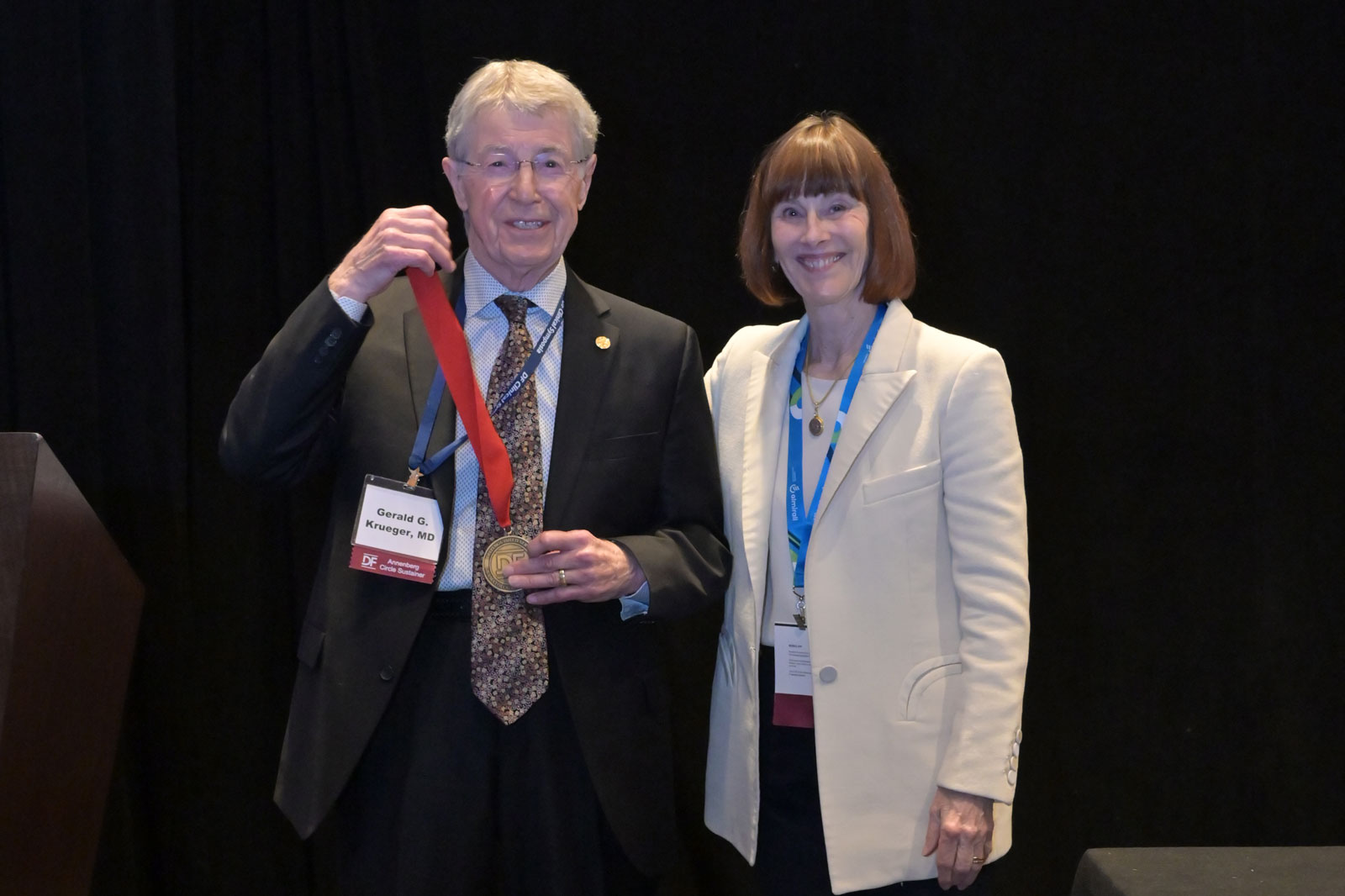An Advocate for Dermatology
DF 2022 Distinguished Service Medallion recipient
June 2023


The University of Utah’s Department of Internal Medicine recruited Gerald D. Krueger, MD, to become the University’s first dermatologist. He established the University’s dermatology division.
Dr. Gerald Krueger was surprised to learn he had received the DF Distinguished Service Medallion: “I’ve just been doing something I enjoy.”
That “something” includes establishing the first division of dermatology at the University of Utah, making pivotal discoveries that evolved the understanding and treatment of psoriasis, as well as securing sustainable growth for the Dermatology Foundation.
Dr. Krueger may have been surprised, but his colleagues weren’t.
“Dr. Krueger is a relentless, hardworking, generous researcher, mentor, and advocate who has bestowed this enthusiasm on over 30 mentees — nearly all of whom have become dermatologists,” says his colleague Kristina Callis Duffin, MD, MS, professor and chair of the department of dermatology at the University of Utah.
The Distinguished Service Medallion is the highest honor the Foundation confers on a colleague in recognition of exemplary leadership and service to the specialty of dermatology. This prestigious award is a fitting tribute to a fellow dermatologist whose guiding vision and commitment have profoundly impacted the future of dermatology. The award recipient is an inspirational role model for future generations.
An open mind
Dr. Krueger’s vocation developed when he was a medical student at Loma Linda University. He wanted a career as a research physician, and his primary interest lay in radiation oncology. However, as he pursued a research opportunity, a chance encounter caused him to reconsider his choice.
In 1966, the army called on him to serve two years of mandatory army duty and agreed to fund his radiation oncology training. He was posted at the Fort Bragg military base in North Carolina as a general medical officer.
As Dr. Krueger prepared to leave for Fort Bragg, he met dermatologist Dr. Robert Katz. He posited that Dr. Krueger would derive greater satisfaction from dermatology — interacting with patients, establishing bonds, and observing a treatment’s effects first-hand. He also noted dermatology was poised for many breakthroughs at the molecular level.
Dr. Katz was also headed for Fort Bragg and suggested they meet in the dermatology unit at the Womack Army Medical Center. Dr. Krueger had received less than one day of dermatology training in medical school.
As a general medical officer in the 82nd Airborne Division, Dr. Krueger had considerable free time. He asked Dr. Katz if he could tag along — he was seeing patients for at least two half-days a week. Dr. Katz responded, “I would be delighted for you to join me.”
After five months, Dr. Krueger, seven other general medical officers and the entire 3rd Brigade of the 82nd Airborne Division were sent to Vietnam to turn back the Tet Offensive.
When Dr. Krueger was leaving Fort Bragg, Dr. Katz asked him where he was going to do his dermatology residency. When Dr. Krueger replied he was already positioned to start his radiation oncology specialty training, Dr. Katz said to him “You will be very disappointed, you should strongly consider becoming a dermatologist.”
Dr. Krueger had a lot of time to think this through during his tour of duty. Ultimately he took Dr. Katz’s advice. He went on to do his residency in dermatology at the University of Colorado and graduated in 1972.
“That’s how I came to be a dermatologist,” he said.
Chasing ideas
Dr. Krueger enrolled in the dermatology program at the University of Colorado, and during his residency added one half-day a week to pursue graduate immunology courses. In 1972, after three years of residency in Colorado, the University of Utah’s Department of Internal Medicine recruited him to become the University’s first dermatologist. His new knowledge in immunology led him to make psoriasis his area of expertise.
He worked with students pursuing a PhD in basic science and post-doctoral candidates studying one of the hard sciences. He drew from this experience to give them the most practical advice: “If you have a new idea that has a solid basis, pursue it. If you find it doesn’t work out chase another idea.”
In the late 1970s and 1980s, Dr. Krueger’s research resulted in a breakthrough — namely, that psoriasis is a T-cell-mediated immune disease and that uninvolved skin of psoriasis is “psoriasis waiting to happen”. His discoveries and those of others paved the way for the development of very effective treatments directed at immune-mediated cytokines, dramatically changing treatment approaches for psoriasis and several other immune-mediated diseases.
By 1980, Dr. Krueger had succeeded in establishing a solid research base with NIH grant support. Today, he is recognized internationally as an expert in the care and management as well as the molecular basis of all aspects of psoriasis.

After 16 years at the helm of the dermatology division, Dr. Krueger stepped down and convinced the chair to name Dr. Zone (left) head of the dermatology division.
New leadership
In 1987, Dr. Krueger recruited Dr. John Zone, who had an interest in antibody-mediated skin disease. Like Dr. Krueger, he also wanted to see the division grow; and as Dr. Krueger put it “he had the energy, foresight and skills needed to do it.”
By 1988, Dr. Krueger wanted to step down to make room for new leadership. He was able to convince the chair of internal medicine to name Dr. Zone as head of dermatology.
Consequently, Dr. Krueger had more time for basic research, clinical trials, and patient care to donate to the causes of the Dermatology Foundation and the National Psoriasis Foundation.
Under Dr. Zone’s leadership, in 1990 the dermatology division became the dermatology department. At the time it counted 12 faculty members; today there are more than 50.
A sustainable path
Dr. Krueger was a Foundation member for 35 years (1987-2022) and a stalwart representative of the Board for several years, including one as secretary-treasurer and three as president.
He attributes his membership and long-standing support of the Foundation to two of its Board members: Dr. John Voorhees and Dr. David Bickers. They recruited him and Dr. Jim Leyden to join the Board (formerly the Executive Committee) and tasked them to recruit three additional members. They recruited Drs. Howard Dubin, Jouni Uitto and Bruce Wintroub.
When Dr. Bickers announced he was stepping down, he presented the Board’s new officers: Dr. Leyden as chairman, Dr. Dubin as president, and Dr. Krueger as secretary-treasurer.
Drs. Leyden, Dubin, Krueger, Uitto, and Wintroub worked together to launch five significant initiatives to increase DF membership and ensure a continual funding stream for the Foundation: the Leaders Society (1989), the Annenberg Circle (1994), the Better Skin Care Through Research program (1999), the Annenberg Circle Sustaining Membership program (2004), and the Fitzpatrick Legacy Fund (2005).
The Leaders Society was established in 1989 and has the largest membership of the Foundation’s programs. $1,500 annual contributions fund the research pipeline.
Joining the Annenberg Circle calls for a $25,000 commitment as a single gift or spread out over 5 years with annual contributions of $5000. Annenberg Circle Sustainers contribute $5,000 annually. Both programs provide a stable source of future research support for the Foundation, as funds are donated to the endowment fund.
The Board launched the Better Skin Care Through Research program to educate residents about the purpose of the Foundation during their training — before they begin their practice. The team’s goal was to present the Foundation to residency programs across the US once every three years.
Residents receive free, full memberships in the Foundation, and they can elect to become full members at a level of giving at their discretion and capacity to give.
Dr. Krueger oversaw the program for 17 years. “My goal,” he said, “was to make sure every dermatology resident in the US knew about the Foundation and what it does to improve their and their patients’ lives.”
The Fitzpatrick Legacy Fund pays tribute to Dr. Thomas B. Fitzpatrick, one of the Foundation’s founding members. Contributors make a 5-year commitment that totals $100,000.
Devotion to service
Dr. Krueger no longer sees patients at the University of Utah Health, where he began his career in dermatology and committed to a lifetime of service. In December 2022, he began a two-year phased retirement plan; he mentors a junior faculty and raises funds for a research endowment.
During the interview with Dermatology Focus, Dr. Krueger was in his office, packing decades’ worth of notebooks. He was preparing to move to a new building, where he’ll share office space with two seasoned faculty members. “I’m trying to figure out what to do with them [notebooks] all,” he said. “I know I will have to get rid of them,” but admitted it was hard to do.
He may no longer be doing research, but his passion for it remains.
Learn more about the DF Honorary Awards.
BIOGRAPHY
Dr. Gerald Krueger holds the title of Distinguished Professor in the Department of Dermatology University of Utah and Emeritus Chair of the Benning Society.
Dr. Krueger is recognized internationally as an expert in psoriasis research, and has received numerous awards, including the Taub International Award for Psoriasis Research, the American Skin Association Award for Psoriasis Research, and is the 2022 recipient of the Dermatology Foundation’s Distinguished Service Medallion. He was also honored in 1992 by the National Psoriasis Foundation with two awards: a Lifetime Achievement Award and a Founders Award.
Dr. Krueger has published well over 200 refereed papers. His work on the transplantation of involved and uninvolved skin to athymic mice in the early 1980s provided an early indication that without immune/inflammatory cells, there is no visible lesion of psoriasis.
In 2001 Dr. Krueger and Dr. Callis Duffin started the Utah Psoriasis Initiative with the goal of creating a registry of patients with psoriasis. This registry contains medical and genetic information of the more than 1,400 participants that have been enrolled. The information is being collected to identify genes that drive the different aspects of psoriasis.
PUBLICATIONS
Harris KM, Smilek DE, Byron M, Lim N, Barry WT, McNamara J, Garcet S, Konrad RJ, Stengelin M, Bathala P, Korman NJ, Feldman SR, Boh EE, Barber K, Laumann AE, Helfrich YR, Krueger GG, Sofen H, Bissonnette R, Krueger JG (2021). Effect of Costimulatory Blockade With Abatacept After Ustekinumab Withdrawal in Patients With Moderate to Severe Plaque Psoriasis: The PAUSE Randomized Clinical Trial. JAMA Dermatol (157(11), pp. 1306-1315). United States.
Papp KA, Lebwohl MG, Kircik LH, Pariser DM, Strober B, Krueger GG, Berk DR, Navale L, Higham RC (2021). The Proposed PASI-HD Provides More Precise Assessment of Plaque Psoriasis Severity in Anatomical Regions with a Low Area Score. [Letter to the editor]. Dermatol Ther (Heidelb), 11(4), 1079-1083.
Belman S, Walsh JA, Carroll C, Milliken M, Haaland B, Callis Duffin K, Krueger GG, Feng BJ (2021). Psoriasis characteristics for the early detection of psoriatic arthritis. J Rheumatol, 48(10), 1559-1565.
… more

